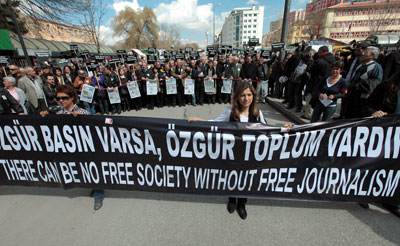Prime Minister Recep Tayyip Erdoğan would like to take credit for Turkey’s economic growth and increasing regional influence, but when challenged on his country’s abysmal press freedom record he tends to blame others, including the media itself which, he says, exaggerates the problem.
But the facts speak for themselves, as I noted in a letter CPJ sent yesterday to the prime minister. In it, we condemned the recent raids that have rounded up at least 29 journalists and we criticized the government for the politicized legal process that has led to the imprisonment of dozens of other journalists across the country.
We also noted that at least eight journalists have been jailed directly because of their work, a number which places Turkey among the world’s worst jailers of journalists, just behind Burma.
However, for many Turkish journalists and media organizations, our tally is too low. When we released our census of imprisoned journalists on December 8, we came under attack. You can read the debate here.
The fierceness of this debate shows just how polarized Turkish media has become. Meanwhile, the legal process is opaque and trials are sometimes secret. In this environment, it’s extraordinarily difficult for us to determine why a particular journalist has been jailed.
While we have an expansive and evolving definition of what constitutes journalism – it includes blogging and using social media to inform the public — as an organization dedicated to the defense of press freedom, we make a distinction between journalism and political activism. This has been a touchstone of CPJ’s work since we were founded 30 years ago. We also apply journalistic rigor to all of our work and rely on our own research. We do not affirm something to be true unless we can independently confirm it.
Various groups – from the Organization for Security and Co-operation in Europe to Turkey’s Freedom for Journalists Platform – have published lists of the journalists in prison in Turkey. Their tallies range from 56 to more than 70. We used these lists as the starting point for our own research, systematically reviewing each case. Our Turkish-speaking researcher based in Istanbul worked closely with our staff in New York on this painstaking task.
What we found is that while there are many assertions, there is often little factual evidence. In some cases, we could not find a single bylined story. This does not mean that the person wasn’t a journalist arrested for his or her work; only that we could not confirm this fact. In other cases, such as the detention since 2009 of Mustafa Balbay, we have not been able to determine that Balbay’s journalism, as opposed to his extensive political activism, is the cause of his arrest. As we recently told a visiting delegation from Balbay’s Republican People’s Party (CHP), we are appalled by the lack of due process in his case and reject the charges of terrorism even though we did not include him on our list of people imprisoned for journalistic work.
CPJ has a long history of advocacy in Turkey. In 1996, CPJ research determined that Turkey was imprisoning 78 journalists for their work, making it the world’s leading jailer at the time. We were denounced by some in the Turkish media of deliberately inflating the number. We ignored the criticism and fought for the release of every single imprisoned reporter, confronting the government and visiting journalists in jail.
In 2006, now-Deputy Director Robert Mahoney attended the trial in Istanbul of five newspaper columnists charged by nationalist prosecutors with denigrating the Turkish state in their writings, and we defended them vigorously. In June this year, Mahoney visited Turkey again to report on the threats to press freedom and interview jailed journalists.
Our goal is to ensure that our information is as accurate and credible as possible and to use our research to confront Turkish authorities and demand justice. This has been our consistent approach to our work in Turkey and throughout the world.
We recognize that Turkey’s intensifying media crackdown has become a grave threat to its emerging democracy, and we plan to send a CPJ delegation to Turkey in 2012 to further investigate. In carrying out our research, we hope to have the cooperation of Turkish journalists and organizations fighting for press freedom in their own country. After all, we share a common purpose: To ensure that journalists in Turkey are able to work freely without fear of legal harassment or the threat of jail.
